In today's competitive job market, identifying candidates with strong communication skills is essential for building successful teams. That's why we've compiled a comprehensive list of communication interview questions to help you efficiently evaluate applicants.
This blog post offers a range of questions across different skill levels, from basic to advanced, as well as questions specific to team collaboration and conflict resolution. It's structured to provide you with the right tools to assess junior specialists, mid-tier professionals, and senior experts.
By using this guide, you can ensure that you are hiring top talent with the necessary communication abilities. Additionally, consider incorporating our communication test before interviews to streamline the selection process.
Table of contents
10 basic Communication interview questions and answers to assess applicants
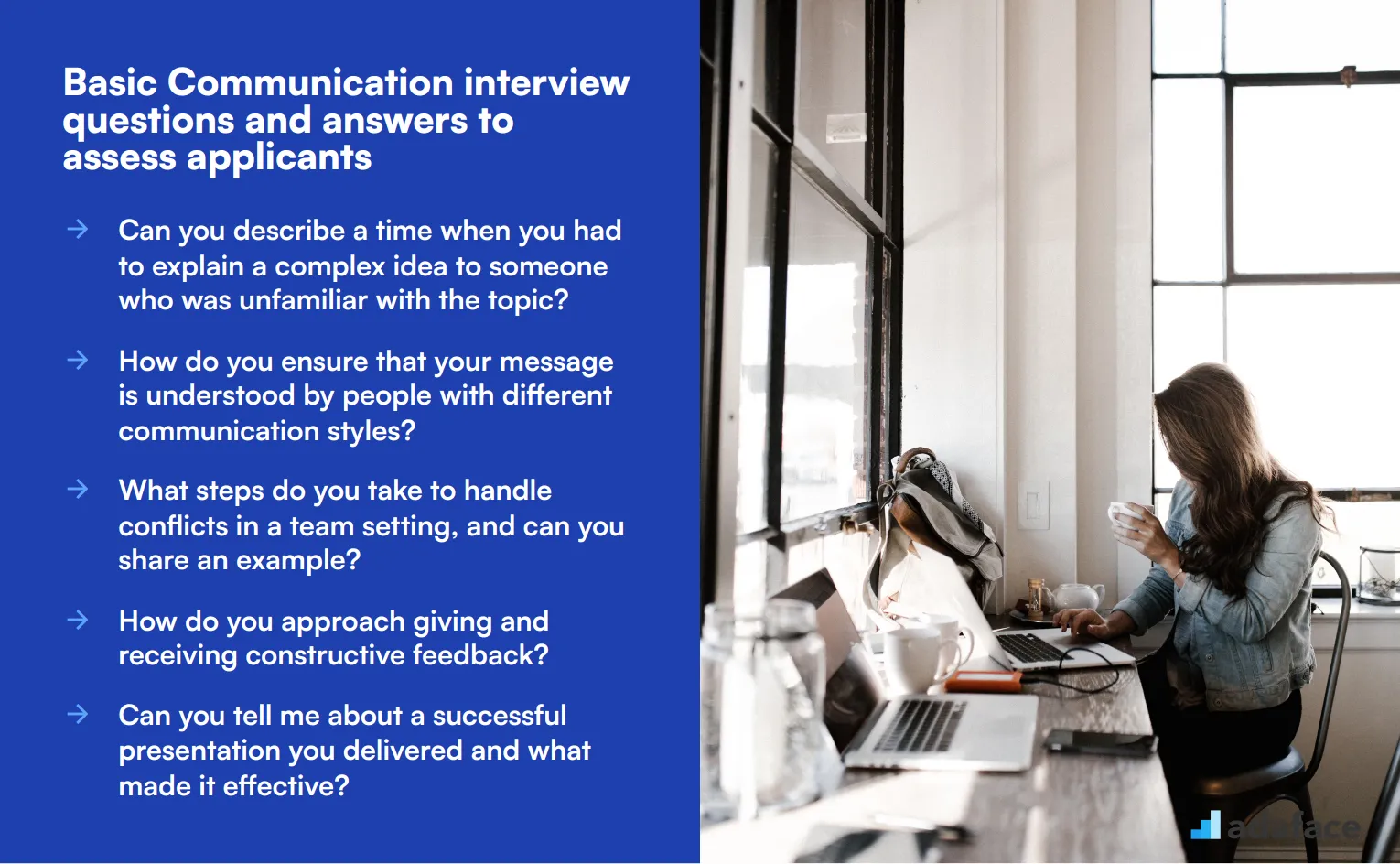
To effectively evaluate your candidates' communication skills, consider these essential questions during the interview process. They will help you uncover how well applicants can convey ideas and engage with others in various situations, making them suitable for roles in areas like public relations.
- Can you describe a time when you had to explain a complex idea to someone who was unfamiliar with the topic?
- How do you ensure that your message is understood by people with different communication styles?
- What steps do you take to handle conflicts in a team setting, and can you share an example?
- How do you approach giving and receiving constructive feedback?
- Can you tell me about a successful presentation you delivered and what made it effective?
- How do you adapt your communication strategy when working with remote teams?
- What techniques do you use to actively listen to others during conversations?
- How do you prioritize clarity and conciseness in your written communication?
- In what ways do you ensure that you are engaging your audience during meetings?
- Can you provide an example of how you've tailored your communication for a specific audience?
8 Communication interview questions and answers to evaluate junior specialists
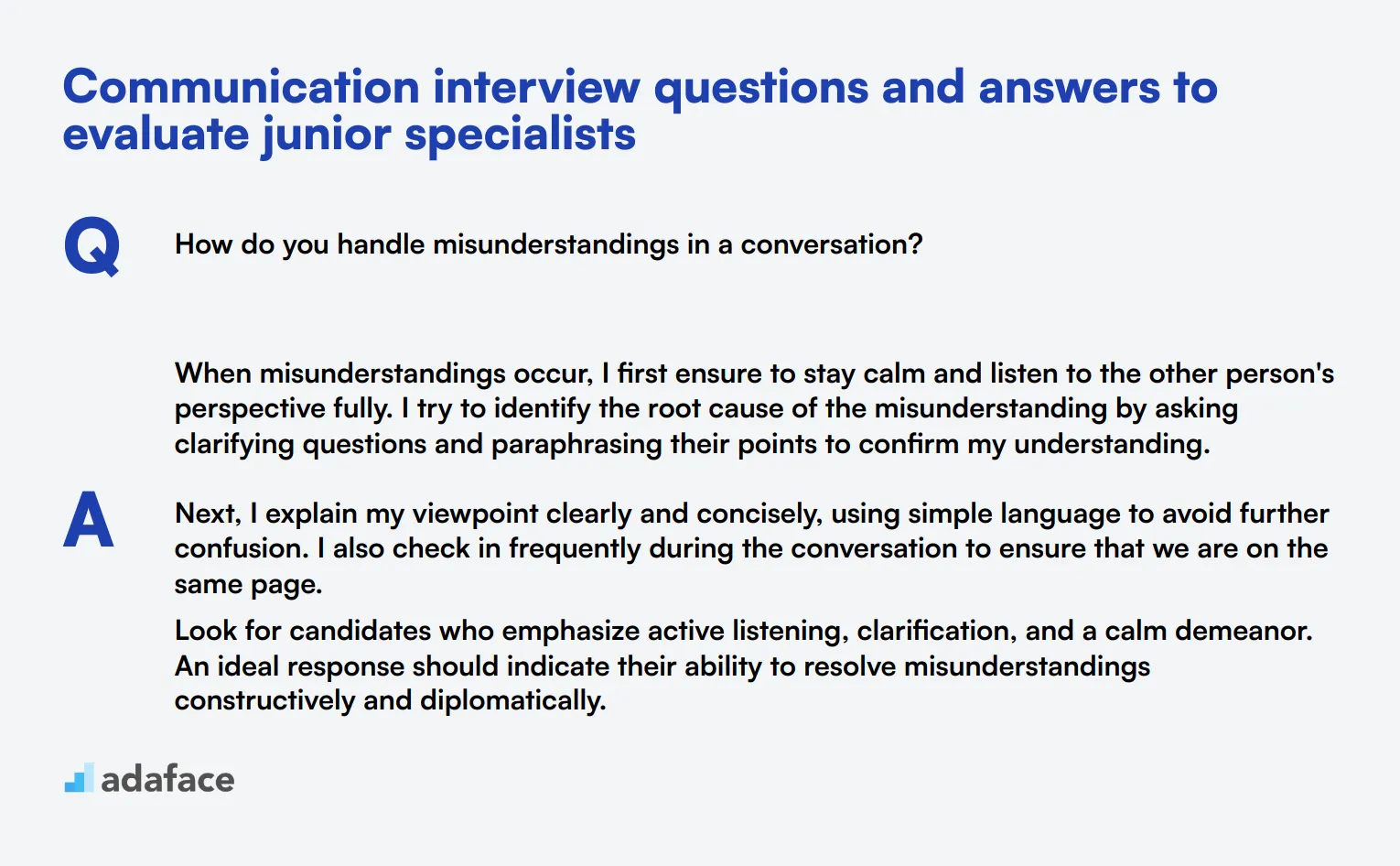
To pinpoint the right junior specialists who excel in communication, you can use this list of tailored interview questions. These questions are designed to assess their ability to articulate ideas, manage conflicts, and engage effectively with different audiences in a professional setting.
1. How do you handle misunderstandings in a conversation?
When misunderstandings occur, I first ensure to stay calm and listen to the other person's perspective fully. I try to identify the root cause of the misunderstanding by asking clarifying questions and paraphrasing their points to confirm my understanding.
Next, I explain my viewpoint clearly and concisely, using simple language to avoid further confusion. I also check in frequently during the conversation to ensure that we are on the same page.
Look for candidates who emphasize active listening, clarification, and a calm demeanor. An ideal response should indicate their ability to resolve misunderstandings constructively and diplomatically.
2. Can you describe a time when you had to communicate bad news to a team or client?
In a previous role, I had to inform a client that a project deadline would be missed due to unforeseen circumstances. I scheduled a meeting with the client to discuss the situation openly and transparently. I explained the reasons for the delay, the steps we were taking to mitigate the impact, and offered a revised timeline.
I also provided assurance that we would focus on quality and not rush the project, and I committed to regular updates moving forward. The client appreciated the honesty and the proactive approach we took to manage the situation.
An ideal response should reflect empathy, transparency, and a proactive approach to problem-solving. Look for indications that the candidate can handle difficult conversations while maintaining a professional relationship.
3. How do you make sure your emails are clear and professional?
I start by outlining the key points I want to convey and ensuring they are logically structured. I use simple and direct language, avoiding jargon and long-winded sentences. Before sending, I review the email to check for grammatical errors and ensure the tone is appropriate for the recipient.
I also consider the recipient's perspective, making sure to address any potential questions or concerns they might have. If the email is particularly important, I may ask a colleague to review it for feedback before sending it out.
Candidates should demonstrate attention to detail, clarity, and a professional tone in their written communication. Look for examples of their proofreading process and their strategies for ensuring their message is well-received.
4. What do you do to keep yourself updated with the latest communication trends?
I regularly read industry blogs, attend webinars, and participate in online forums related to communication and my field. I also follow thought leaders on social media to stay informed about the latest trends and best practices.
Additionally, I take courses and certifications to deepen my understanding and improve my skills. Networking with peers and attending industry conferences also helps me stay updated and exchange knowledge.
Look for continuous learning and a proactive attitude towards professional development. The candidate should demonstrate a genuine interest in staying current with industry trends and improving their communication skills.
5. How do you manage multiple communication channels effectively?
To manage multiple communication channels, I prioritize the channels based on urgency and importance. I use tools like project management software to keep track of tasks and deadlines, and I allocate specific time blocks in my day to check and respond to emails, messages, and other communications.
I also set up notifications for critical messages to ensure I don't miss anything urgent. Regularly reviewing and organizing my communication channels helps me stay on top of things without feeling overwhelmed.
Candidates should show they can handle multi-channel communication efficiently. Look for their strategies in prioritizing, organizing, and managing time effectively to ensure no important messages are missed.
6. What strategies do you use to ensure effective communication in a multicultural team?
I make an effort to understand the cultural backgrounds and communication preferences of my team members. I use inclusive language and avoid slang or idioms that might be confusing. I also encourage open communication and invite team members to share their perspectives and preferences.
Regular team meetings and one-on-one check-ins help address any communication issues and ensure everyone feels heard and valued. I also provide written summaries of discussions to ensure clarity and avoid misunderstandings.
Look for candidates who emphasize cultural sensitivity and inclusivity. Their answers should reflect an awareness of cultural differences and a proactive approach to fostering effective communication in a diverse team.
7. How do you ensure that your communication is respectful and professional in high-stress situations?
In high-stress situations, I make a conscious effort to stay calm and composed. I take a moment to breathe and collect my thoughts before responding. I focus on the issue at hand and avoid personal attacks or emotional language.
I use active listening to understand the other person's perspective and address their concerns respectfully. Keeping communication focused on facts and solutions helps maintain professionalism even under pressure.
Candidates should demonstrate emotional intelligence and self-control. Look for their ability to remain respectful and professional, and their strategies for managing stress effectively in their communication.
8. How do you approach communication when you have to deliver constructive criticism?
I approach constructive criticism with empathy and a focus on the behavior or issue, not the person. I start by acknowledging the individual's strengths and contributions before addressing the area for improvement.
I provide specific examples and suggest actionable steps they can take to improve. I also invite them to share their thoughts and discuss how we can work together to achieve better results.
An ideal response should reflect a balance of honesty and empathy. Look for candidates who emphasize constructive feedback, provide specific examples, and foster a collaborative approach to improvement.
15 intermediate Communication interview questions and answers to ask mid-tier specialists
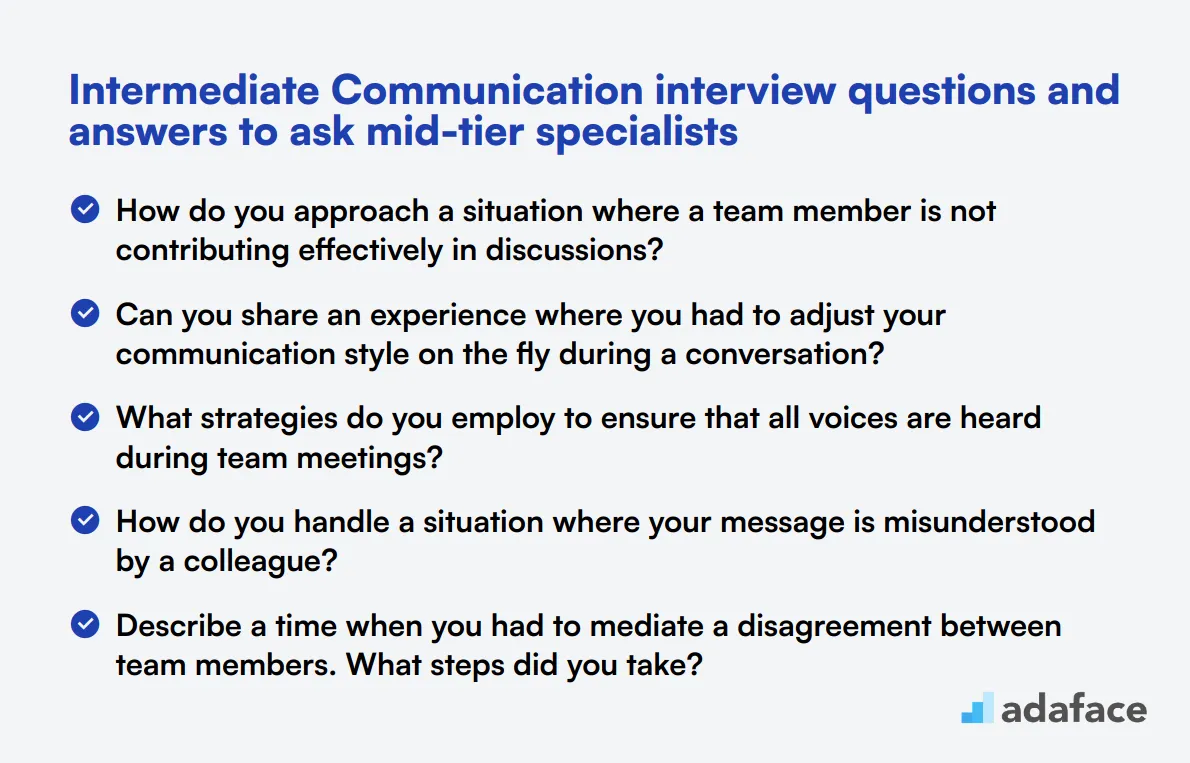
To effectively assess mid-tier specialists' communication skills, consider using this tailored list of questions. These inquiries will help you gauge candidates' ability to convey ideas clearly and collaborate effectively, making it easier to find the right fit for your team. Whether you're hiring for a customer service manager or a public relations role, these questions are essential for evaluating communication competencies.
- How do you approach a situation where a team member is not contributing effectively in discussions?
- Can you share an experience where you had to adjust your communication style on the fly during a conversation?
- What strategies do you employ to ensure that all voices are heard during team meetings?
- How do you handle a situation where your message is misunderstood by a colleague?
- Describe a time when you had to mediate a disagreement between team members. What steps did you take?
- What role does non-verbal communication play in your interactions, and how do you ensure it aligns with your messages?
- How do you follow up with team members to ensure that your communication was effective?
- Can you give an example of a time when you used storytelling to enhance your communication?
- What methods do you use to create an inclusive environment for dialogue within your team?
- How do you gauge whether your communication is being well-received by your audience?
- Can you explain a time when you had to communicate a change in policy or procedure? What approach did you take?
- How do you manage your tone and language when communicating with different stakeholders?
- What techniques do you use to ensure your communication fosters collaboration and teamwork?
- Can you describe a challenge you faced while communicating with a difficult client and how you resolved it?
- How do you keep communication lines open with your team when working on long-term projects?
6 advanced Communication interview questions and answers to evaluate senior specialists
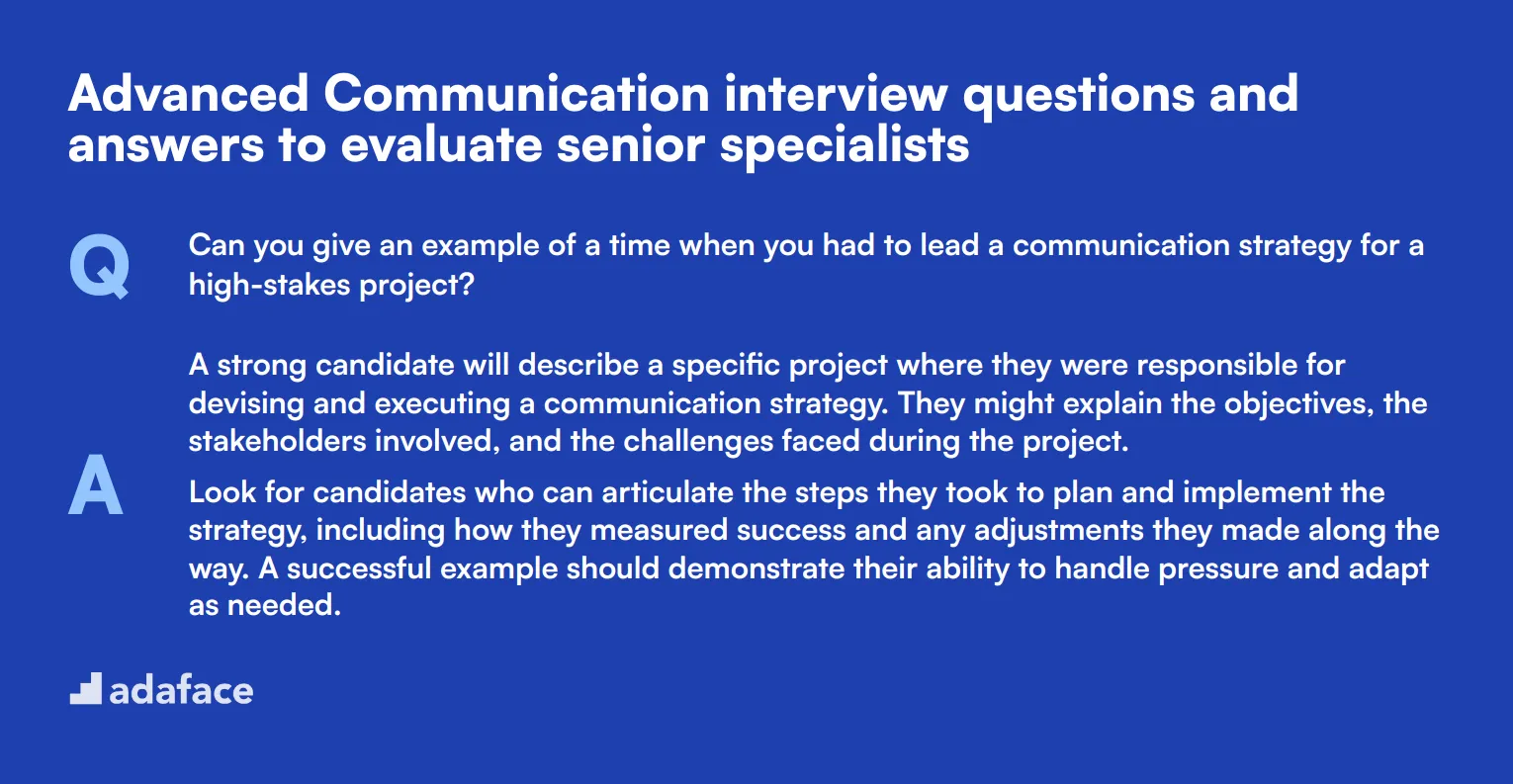
To effectively evaluate senior specialists in communication, you'll need more than just the basics. This list of advanced communication interview questions will help you dig deeper, assess nuanced skills, and find the right fit for your team.
1. Can you give an example of a time when you had to lead a communication strategy for a high-stakes project?
A strong candidate will describe a specific project where they were responsible for devising and executing a communication strategy. They might explain the objectives, the stakeholders involved, and the challenges faced during the project.
Look for candidates who can articulate the steps they took to plan and implement the strategy, including how they measured success and any adjustments they made along the way. A successful example should demonstrate their ability to handle pressure and adapt as needed.
2. How do you ensure that your communication aligns with the company's brand and values?
Candidates should discuss their approach to understanding and embodying the company's brand and values in all their communications. This might involve regular consultations with marketing and branding teams, as well as consistent reviewing of brand guidelines.
Strong answers will show a proactive approach to maintaining brand consistency and might include examples of tools or processes they use to ensure all communication is on-brand. Look for a deep understanding of the importance of aligning messages with the company's identity.
3. Describe a time when you had to manage communication during a crisis.
An ideal candidate will describe a specific crisis situation, emphasizing the steps they took to manage communication effectively. This could include identifying key stakeholders, crafting clear and timely messages, and using appropriate channels to disseminate information.
Look for examples that demonstrate their ability to remain calm under pressure, make quick decisions, and maintain transparency with all parties involved. Effective crisis communication often involves balancing honesty with reassurance.
4. How do you approach creating a communication plan for a new product launch?
Candidates should outline their methodology for developing a comprehensive communication plan, including setting objectives, identifying target audiences, and selecting appropriate channels. They might also discuss the importance of coordinating with other departments like marketing and sales.
An effective response will include specifics about how they measure the success of the launch, such as through KPIs or metrics. Look for a structured approach that includes pre-launch, launch, and post-launch phases.
5. Can you talk about a time when you had to communicate across different departments? How did you ensure alignment?
A strong candidate will share an example where they facilitated communication between various departments. They might discuss the tools and techniques they used to ensure everyone was on the same page, such as regular updates, meetings, or collaborative platforms.
Look for an ability to foster collaboration and ensure that all parties are aligned with the project's goals and timelines. Effective communication across departments is crucial for organizational cohesion.
6. How do you tailor your communication style when interacting with different levels of stakeholders, such as executives versus team members?
Candidates should explain their approach to adapting their communication style based on the audience. For example, they might be more concise and data-focused with executives, while using a more detailed and collaborative approach with team members.
Look for examples that show their ability to read the room and adjust their messaging to fit the needs and preferences of different stakeholders. This flexibility is key to effective communication management.
12 Communication questions related to team collaboration
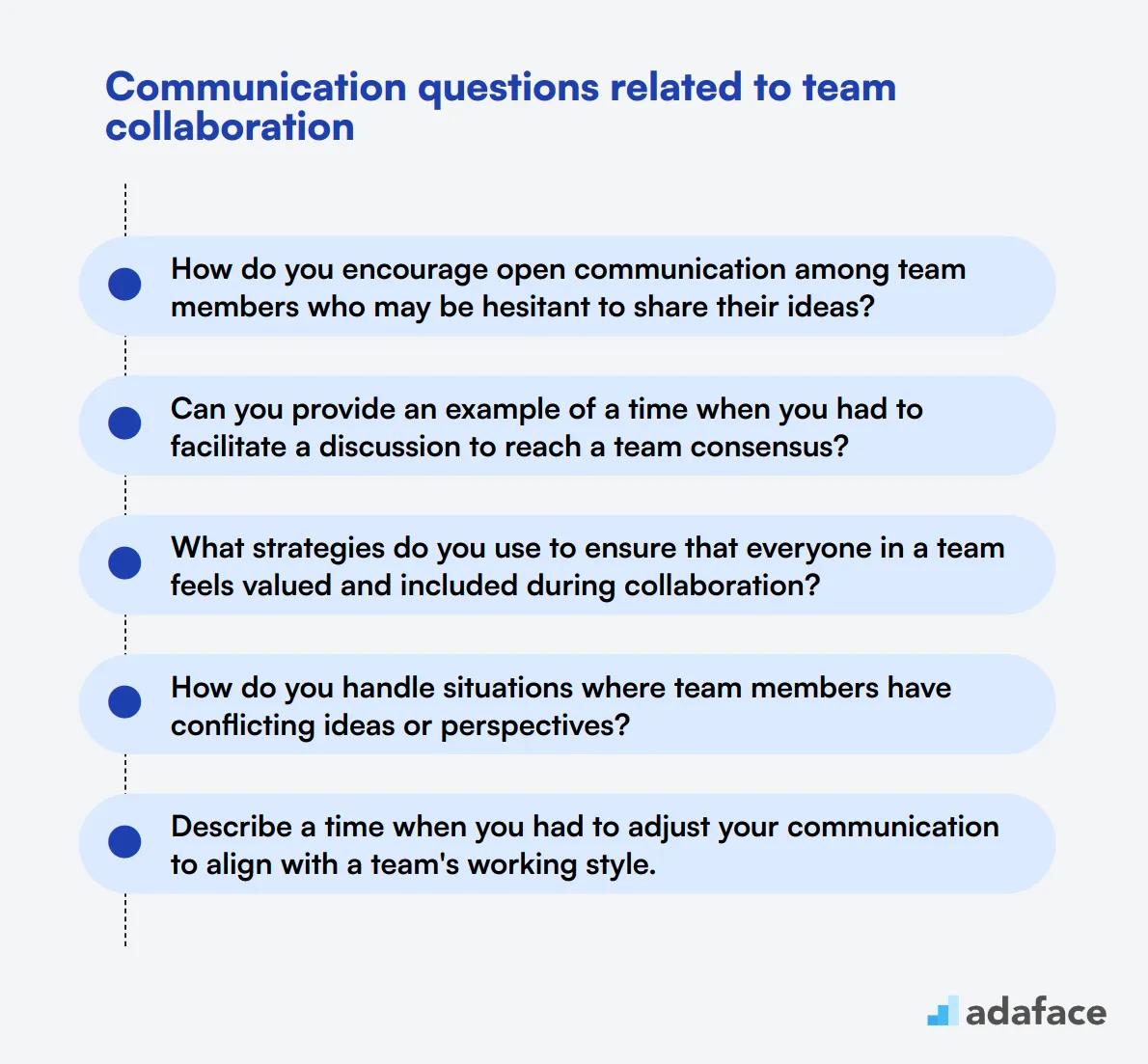
To assess whether candidates can effectively collaborate within a team, consider using this list of communication questions. These targeted inquiries will help you evaluate their teamwork skills and adaptability in various situations, essential for roles in fields like public relations.
- How do you encourage open communication among team members who may be hesitant to share their ideas?
- Can you provide an example of a time when you had to facilitate a discussion to reach a team consensus?
- What strategies do you use to ensure that everyone in a team feels valued and included during collaboration?
- How do you handle situations where team members have conflicting ideas or perspectives?
- Describe a time when you had to adjust your communication to align with a team's working style.
- How do you ensure that project updates are communicated clearly to all team members?
- Can you explain a situation where you had to lead a team through a challenging project or task? What was your communication approach?
- What methods do you use to check in with team members and address any communication gaps?
- How do you approach building relationships with team members to foster better collaboration?
- Can you share an experience where you had to navigate team dynamics to improve communication?
- What tools or platforms do you find most effective for enhancing team communication?
- How do you celebrate team successes and ensure that everyone feels acknowledged for their contributions?
10 Communication questions related to conflict resolution
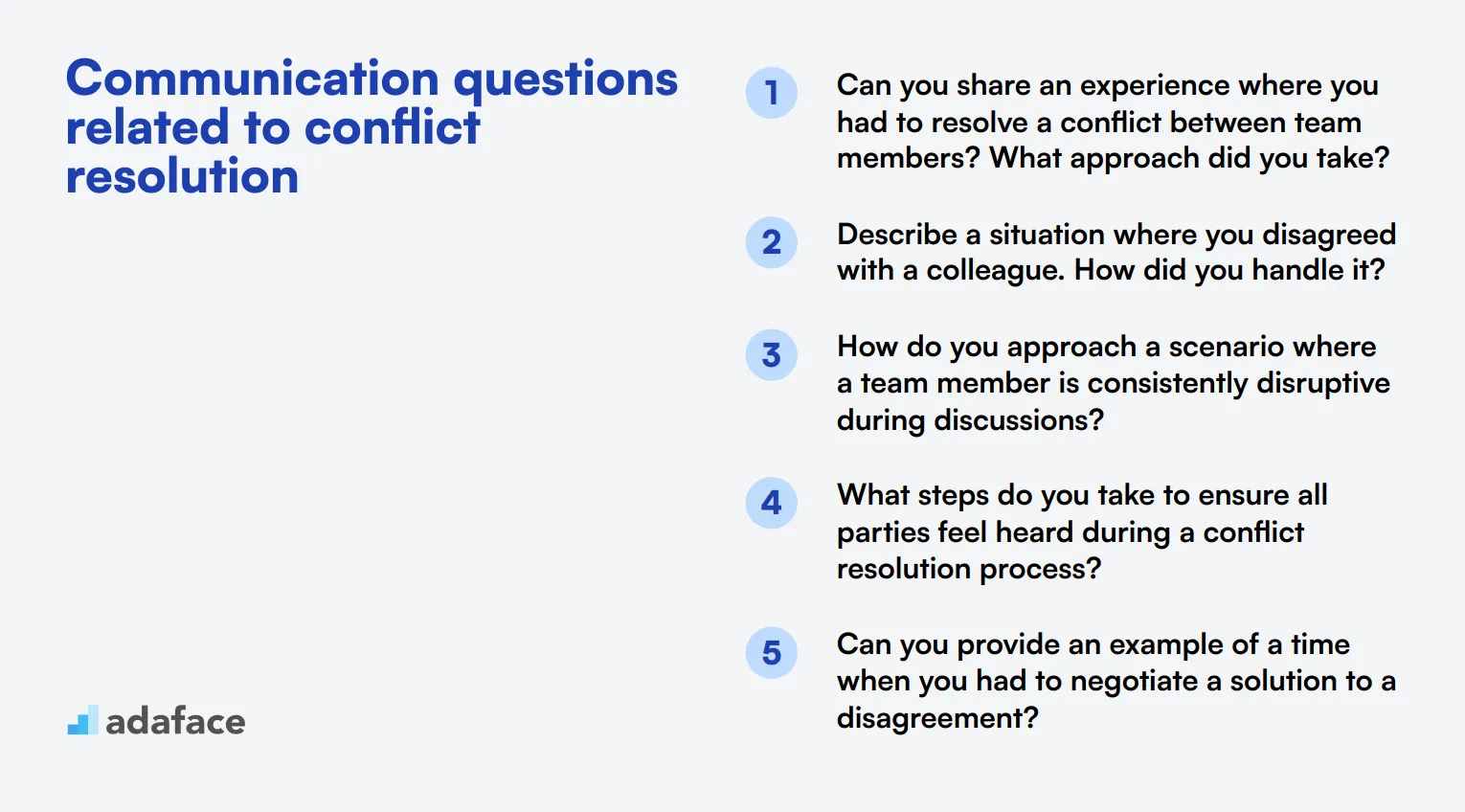
To gauge how well candidates can handle tough situations and resolve conflicts, use these communication questions. They will help you understand applicants' conflict resolution skills and their approach to maintaining team harmony. This is especially relevant for roles such as a public relations manager, where effective communication is key.
- Can you share an experience where you had to resolve a conflict between team members? What approach did you take?
- Describe a situation where you disagreed with a colleague. How did you handle it?
- How do you approach a scenario where a team member is consistently disruptive during discussions?
- What steps do you take to ensure all parties feel heard during a conflict resolution process?
- Can you provide an example of a time when you had to negotiate a solution to a disagreement?
- How do you remain calm and composed when dealing with conflicts in a team setting?
- Describe a time when you had to change your communication style to resolve a conflict more effectively.
- What role do you think empathy plays in resolving conflicts in the workplace?
- Can you explain how you handle situations where emotions run high during a disagreement?
- How do you follow up after a conflict has been resolved to ensure lasting harmony in the team?
10 behavioral Communication interview questions
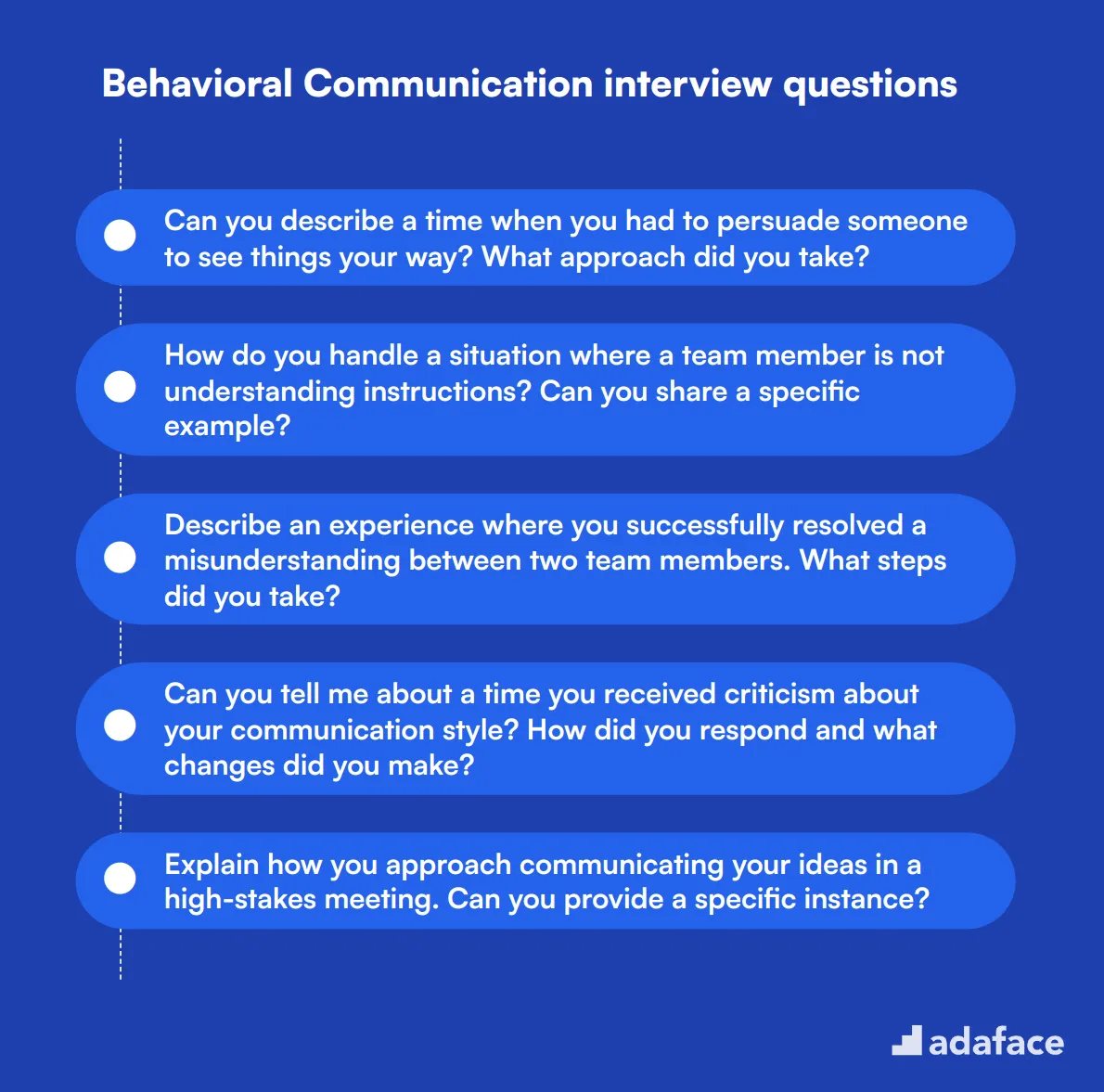
To effectively assess a candidate's communication skills, consider using these behavioral questions during your interviews. They will help you identify how applicants handle real-world situations and adapt their communication strategies. This approach is particularly useful for roles such as a customer service manager or a public relations specialist.
- Can you describe a time when you had to persuade someone to see things your way? What approach did you take?
- How do you handle a situation where a team member is not understanding instructions? Can you share a specific example?
- Describe an experience where you successfully resolved a misunderstanding between two team members. What steps did you take?
- Can you tell me about a time you received criticism about your communication style? How did you respond and what changes did you make?
- Explain how you approach communicating your ideas in a high-stakes meeting. Can you provide a specific instance?
- What strategies do you use to keep remote team members engaged during discussions? Can you give an example?
- Describe a situation where you had to balance multiple viewpoints in a conversation. How did you ensure everyone felt heard?
- How do you approach sharing sensitive information with your team? Can you give an example of a time you did this effectively?
- Can you provide an example of when you had to communicate with someone from a different cultural background? How did you adapt?
- How do you approach negotiations to reach a consensus? Can you share a specific situation where this was necessary?
Which Communication skills should you evaluate during the interview phase?
Evaluating a candidate's communication skills in a single interview can be challenging. However, there are core skills that are particularly important to assess, as they can greatly influence team dynamics and overall organizational success.
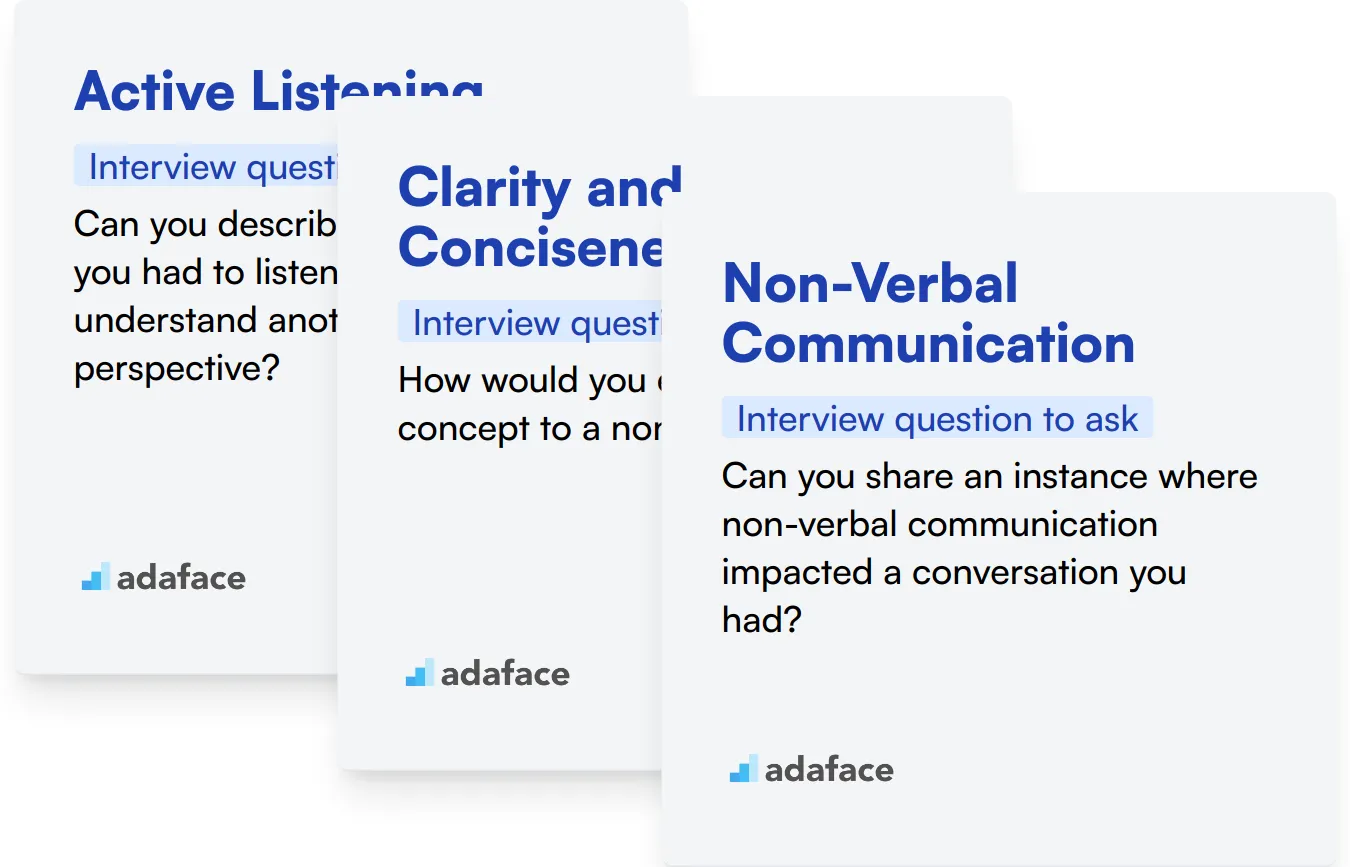
Active Listening
To assess active listening, consider using an assessment test that includes relevant multiple-choice questions. This can help filter candidates who demonstrate strong listening abilities. For instance, our Communication Skills test offers insights into this competency.
You can also gauge active listening by asking targeted interview questions that require the candidate to paraphrase or summarize information.
Can you describe a time when you had to listen carefully to understand another person's perspective?
When asking this question, look for the candidate's ability to reflect on the experience and convey how they processed the information. Pay attention to their examples of empathy and comprehension.
Clarity and Conciseness
Consider using an assessment that focuses on clarity and conciseness through multiple-choice questions. This method can efficiently highlight candidates who excel in this area.
To further evaluate this skill, you might ask the candidate how they would explain a complex topic to someone with little background knowledge.
How would you explain a difficult concept to a non-expert?
Observe how the candidate breaks down the concept. Their ability to simplify ideas without losing essential details indicates their proficiency in clarity and conciseness.
Non-Verbal Communication
Use assessments that include multiple-choice questions focused on non-verbal communication to help identify candidates who are aware of and can effectively use non-verbal cues.
In interviews, consider asking candidates how they interpret non-verbal communication in a team setting.
Can you share an instance where non-verbal communication impacted a conversation you had?
Look for insights into how the candidate recognizes and responds to non-verbal signals. Their response will indicate their awareness and understanding of this key communication aspect.
3 Tips for Effectively Using Communication Interview Questions
Before you start implementing what you've learned about communication interview questions, here are some practical tips to help you get the most out of your evaluations.
1. Incorporate Skills Assessments Before Interviews
Using skills assessments before interviews is a strategic way to narrow down your candidate pool. These tests can reveal a candidate's true capabilities, ensuring a better match for your requirements.
For communication skills, consider using the Communication Test or the Customer Service Test. These specialized assessments can gauge a candidate’s ability to communicate effectively in workplace scenarios.
By integrating these tests into your hiring process, you can streamline your interviews and focus on candidates who demonstrate the necessary skills, thus enhancing the quality of your hiring decisions.
2. Curate Targeted Interview Questions
Time is often limited during interviews, so it's important to select a focused set of questions that will help you evaluate the candidate's communication skills effectively. Aim to ask around five to seven targeted questions, ensuring they cover different aspects of communication.
Consider incorporating relevant questions related to soft skills or even specific technical skills from other domains. For example, you could reference interview questions related to customer service or team collaboration to further diversify your evaluation.
By preparing a well-structured list of questions, you can maximize your interview's effectiveness and ensure you are assessing candidates on the key competencies needed for success in the role.
3. Ask Follow-Up Questions
Simply asking interview questions isn't enough; follow-up questions are essential for digging deeper into a candidate's responses. Candidates might provide surface-level answers, so probing further can reveal their genuine understanding and capabilities.
For example, if a candidate states they resolved a team conflict, a good follow-up question could be, 'What specific steps did you take to achieve that resolution?' This probes their depth of involvement and helps you assess their true problem-solving abilities.
Use Communication interview questions and skills tests to hire talented candidates
If you are looking to hire someone with strong communication skills, you need to ensure that they possess these skills accurately. The best way to do this is to use skills tests such as our Communication Test and Verbal Reasoning Test.
Once you use these tests, you can shortlist the best applicants and call them for interviews. For further assistance, you can sign up here or explore our online assessment platform.
Customer Service Test
Download Communication interview questions template in multiple formats
Communication Interview Questions FAQs
Communication skills are vital because they enable effective collaboration, conflict resolution, and ensure clear and concise information exchange.
For junior specialists, focus on basic communication skills, such as how they handle instructions, feedback, and simple conflict resolution.
Ask intermediate questions that gauge their ability to communicate within a team, handle moderate conflicts, and exhibit leadership in communication.
Include advanced questions that test their strategic communication skills, leadership in conflict resolution, and their ability to mentor and guide others.
Focus on questions that explore how candidates contribute to a team, how they resolve conflicts, and their ability to collaborate effectively with different personalities.
Present questions clearly and provide context if necessary. Ensure they are relevant to the role and allow candidates to demonstrate their communication skills thoroughly.

40 min skill tests.
No trick questions.
Accurate shortlisting.
We make it easy for you to find the best candidates in your pipeline with a 40 min skills test.
Try for freeRelated posts
Free resources




